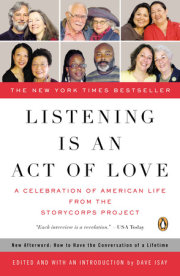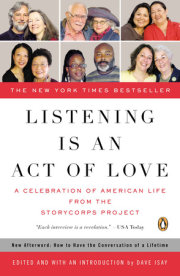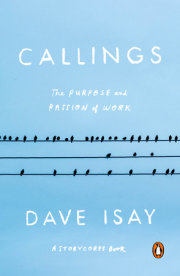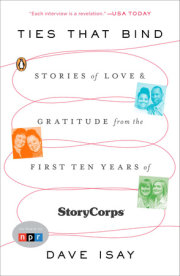FROM STORYCORPS: THE CONVERSATION OF A LIFETIME
Recording your own interviews:
We encourage you to participate in StoryCorps. Please visit our website, www.storycorps.net, to learn about the locations of our StoryBooths across the country. We also have two permanent facilities open year-round in Manhattan. Come visit New York City, make an appointment and record your loved one’s voice for history. If you want to record an interview but are not able to visit one of our StoryBooths, we encourage you to do-it-yourself. Conduct your own interview and ask the questions you’ve always wanted to ask. You may well be surprised by the power of the experience.Here’s how:
1. Pick a Storyteller
Start the process by figuring out whom you want to interview. A grandparent? An old friend? Your mom? The person you invite might be hesitant. “I don’t have much to talk about,” he’ll say, or, “You already know everything about my life.” Remind your friend, your mother—whoever it is—how important you think their story is and how valuable it will be to future generations. Let that person know you would be honored to record his story.
2. Create a Question List
No matter how well you know your storyteller, a little preparation will improve the quality of your interview enormously. What would you like to learn from that person? We’ve designed a question generator to make preparing questions a little easier. You can find it at www.storycorps.net.
Here are some questions that have yielded great responses:
· What have you learned in life?
· What does your future hold?
· What are you most proud of?
· Do you have any regrets?
· What was the happiest moment of your life? The saddest?
· Is there something about yourself that you think no one knows?
· How would you like to be remembered?
We’ve also found that at the end of a session it can be powerful to turn the tables and tell the person you’re interviewing what they mean to you.
3. Purchase or Borrow Recording Equipment(and Get Comfortable with It)
It is not difficult to make a terrific and clear recording of someone’s voice. We strongly suggest that you create a recording with the best sound quality possible—it’s much more enjoyable and easy to listen to and will be appreciated by future generations. You will need three pieces of equipment: a recording device, a microphone and headphones. (You can learn more about equipment options at our website.) The recording equipment can be as simple as a micro cassette recorder or basic digital voice recorder, a pair of headphones and an inexpensive microphone (handheld, not clip-on). You can find both basic and more sophisticated recording equipment at your local electronics store. (StoryCorps also has a small equipment loan program called StoryKits, which you can also learn about at our website.)
Whatever equipment you choose, we strongly suggest that you practice using your equipment before you sit down for your interview.
A few things to remember:
· It’s best to always wear headphones when recording. Your headphones are your “ears” for the interview; they tell you exactly what you’ll hear on your finished recording. Use them to adjust the microphone position so the sound is as clear as possible.
· Hold the microphone close, about one spread-out hand’s length from your storyteller’s mouth. Always hold the microphone in your hand, moving it between you and your storyteller.
· Be careful of microphone noise. The low rumbling sound you hear when you move the microphone in your hands is known as “mic-handling noise.” You can avoid it by using a light touch and not shifting around too much. If you need to move the microphone, make sure to wait until your storyteller has finished speaking.
You may want to get together a group of friends and purchase recording equipment together. Someone from the group can act as the “engineer” during your interview and operate the equipment so you can focus on asking the questions. You can also share and talk about the stories you’ve recorded with the group.
4. Choose an Interview Location
Pick the quietest place possible. A carpeted living room or bedroom is often best. Avoid large empty rooms and kitchens, which are filled with reflective surfaces and appliance noise. We try to make the inside of each StoryCorps booth something of a sacred space, as peaceful and serene as possible. You may want to do the same: turn the lights low. Do whatever you can to make you and your subject as comfortable as possible.
Prevent noisy distractions. Close the door; unplug the phone; turn off your cell phone. Turn off anything that is making noise: buzzing fluorescent lights, air conditioners, fans. Listen for noise during the interview as well. If your storyteller fiddles with her necklace, for example, feel free to let her know it’s making noise. Never record interviews with a radio or television on in the background.
5. Set Up and Test the Equipment
Set up your equipment as early as possible and make sure you’re comfortable with it. This way you’ll be able to focus on the person you are interviewing and not the equipment. Before you begin your interview, record your storyteller answering a few warm-up questions such as “Can you describe what this room looks like?” or, “Tell me what you had for breakfast.” Stop, rewind and listen to the recording you just made to make sure everything is working. Remember to press RECORD again when you start the interview for real.
6. Begin the Conversation
Start your interview by stating your name, your age, the date and the location of the interview. For example, “My name is Annie Smith. I’m forty-one years old. The date is November 23, 2008, and I’m sitting with my grandfather Mark Smith in his living room in Hannibal, Missouri.” Now ask your storyteller to state the same information. Use your question list. Remember, the questions you write in advance are just suggestions. Trust your instincts. If something interests you or merits further exploration, ask more questions. Sometimes your storyteller will need “permission” to talk about a certain topic. Granting that permission might be as easy as saying, “Tell me more.” Don’t let the question list constrain you. Feel free to ask questions in whatever order feels right. Take breaks if your storyteller needs them. Try not to say “uh huh” or interrupt when something interesting or important is being said. You can always use visual cues like nodding your head when you want to encourage the storyteller to keep going.
7. Get Great Stories
Here are some tips for helping the conversation flow:
Listen closely. Look at your storyteller’s eyes, not the mic. Nod your head. Smile. Stay interested and engaged.
Be yourself. You can laugh with the person you are interviewing or even cry with him. Real moments are the best moments.
Stick with the good stuff. When you hear something that moves you, feel free to talk about it more. If the current topic isn’t what you wanted to put on tape, gently steer the conversation back on course.
Ask emotional questions. Questions such as “How does this make you feel?” often elicit interesting responses. Don’t be afraid to ask.
Respect your subject. If there’s a topic she just doesn’t want to talk about, respect her wishes and move on.
Take notes during the interview. Write down any questions or stories you might want to return to later in your interview.
Be curious and honest and keep an open heart. Great things will happen.
8. Wrap It Up
Before you turn off your recorder, do two things: ask the storyteller if there is anything else that she wants to talk about and thank her. Sharing a story can be difficult for some people. It’s a privilege to have someone share her story with you. Express your gratitude. If you have a digital camera, take a picture of your interviewee against a plain background (or, if there’s someone else around, have him take a picture of the two of you) in the style of the StoryCorps pictures you find in this book.
Make sure to label your recordings properly, make copies for relatives and friends and store them in a safe place so they’ll be available for generations to come. (Unfortunately, StoryCorps does not have the capacity at the present time to enter these do-it-yourself interviews into our archives.)
9. Share the Conversation
The conversation doesn’t have to end once you turn off your recorder. In fact, it may just be the beginning. With the permission of your storyteller, you might share the interview by making copies of your recording to give to family and friends. You might also host a listening party. Invite others to your home to listen to your recording and share a conversation afterward. You could also listen to StoryCorps stories on our website.
10. Plant a Seed
Storytelling can be a powerful tool, and your imagination is really the limit of what you can do with it. If you are a teacher, for instance, you might consider playing clips in your classroom as part of a history or writing unit. If you are part of a mentoring program, you could interview your mentor or mentee about their life experiences. Use the checklist and questions that follow to make sharing stories a part of your family, community or working life. Congratulations! You have just joined the StoryCorps revolution!
DO-IT-YOURSELF CHECKLIST
Things to Bring to the Interview
· Your question list
· Recording device
· Microphone
· Headphones
· Extra batteries and tapes
· Pen or pencil
Before You Begin Your Interview
· Find the quietest place possible to record.
· Turn off radios and TVs and move away from noisy appliances like refrigerators and clocks.
· Make sure you and your storyteller are comfortable.
· Do a test recording, holding the microphone about one spread-out hand’s distance from your storyteller’s mouth. If anything sounds strange, stop and figure out what the problem is before starting the interview.
During Your Interview
· Double-check that the recorder is actually recording (not on PAUSE).
· Start each tape with an ID: State your name, your age, the date and the location of the interview. Ask your storyteller to state the same information.
· Don’t say “Uh huh” when your subject is talking. Instead, nod your head.
· Ask emotional questions such as “How did this make you feel?”
· Look your storyteller in the eyes and stay engaged.
· Respect your subject always.
· Don’t be afraid to stick with amazing moments in the interview—if you hear something you’re interested in, ask follow-up questions.
· Be curious and keep an open heart. Great things will happen.
When You Finish
· If you recorded the interview on tape, label it. Store the tapes in a cool place out of direct sunlight.
FAVORITE STORYCORPS QUESTIONS
General
· What are the most important lessons you’ve learned in life?
· What are you most proud of?
· What was the happiest moment of your life? The saddest?
· Is there something about yourself that you think no one knows?
· How would you like to be remembered?
· Is there anything we didn’t talk about that you would like to add?
Childhood and Family
· When and where were you born?
· Where did you grow up and what was it like?
· Tell me about your parents.
· Did you get into trouble? What was the worst thing you did?
· Do you have any siblings? What were they like growing up?
· What did you look like?
· How would you describe yourself as a child? Were you happy?
· What is your best memory of childhood? Worst?
· Did you have a nickname? How’d you get it?
· Who were your best friends? What were they like?
· How would you describe a perfect day when you were young?
· What did you think your life would be like when you were older?
· Can you tell me some classic stories from your childhood?
School and Education
· What are your best memories of grade school/high school/college/graduate school? Worst memories?
· What kind of student were you?
· What would you do for fun?
· How would your classmates remember you?
· Was there a teacher or teachers who had a particularly strong influence on your life? Tell me about them.
· Do you have any other favorite stories from school?
Love and Romance
· Do you have a love of your life?
· When did you first fall in love?
· Can you tell me about your first kiss?
· What was your first serious relationship?
· What lessons have you learned from your relationships?
Marriage and Commitment
· How did you meet your husband/wife?
· How did you know he/she was “the one”?
· How did you propose?
· What were the best times? The most difficult times?
· Did you ever get divorced? Can you tell me about it?
· What advice do you have for young couples?
· Do you have any favorite stories from your marriage or about your husband/wife?
Parenthood
· When did you first find out that you’d be a parent? How did you feel?
· Can you describe the moment when you saw your child for the first time?
· How has being a parent changed you?
· What are your dreams for your children?
· Do you remember when your last child left home for good?
· Do you have any favorite stories about your kids?
Work
· What do you do for a living?
· Tell me about how you got into your line of work.
· Do you like your job?
· What did you want to be when you grew up?
· What lessons has your work life taught you?
· Do you plan on retiring? If so, when? How do you feel about it?
· Do you have any favorite stories from your work life?
Religion and Spirituality
· Can you tell me about your religious beliefs/spiritual beliefs?
· What is your religion?
· Have you experienced any miracles?
· What was the most profound spiritual moment of your life?
· Do you believe in an afterlife? What do you think it will be like?
· When you meet God, what would you want to say to Him?
Ethnicity and Family Heritage
· What is your ethnic background?
· Where is your mom’s family from? Where is your dad’s family from?
· What traditions have been passed down in your family?
· Who were your favorite relatives? Can you tell me any stories about them?
· Do you remember any of the stories they used to tell you?
· What are the classic family stories? Jokes? Songs?
War and Service
· Were you in the military?
· Did you go to war? What was it like?
· How did war change you?
· During your service, can you recall times when you were afraid?
· What are your strongest memories from your time in the military?
· What lessons did you learn from this time in your life?
Illness
· Can you tell me about your illness?
· Do you think about dying?
· Are you scared?
· How do you imagine your death?
· Do you believe in an afterlife?
· Do you regret anything?
· Do you look at your life differently now from before you were diagnosed?
· Do you have any last wishes?
· If you were to give advice to me or my children, or even children to come in our family, what would it be?
· What are the most important things you’ve learned from life?
· Has this illness changed you? What have you learned?
· How do you want to be remembered?
Copyright © 2007 by Dave Isay. All rights reserved. No part of this excerpt may be reproduced or reprinted without permission in writing from the publisher.











